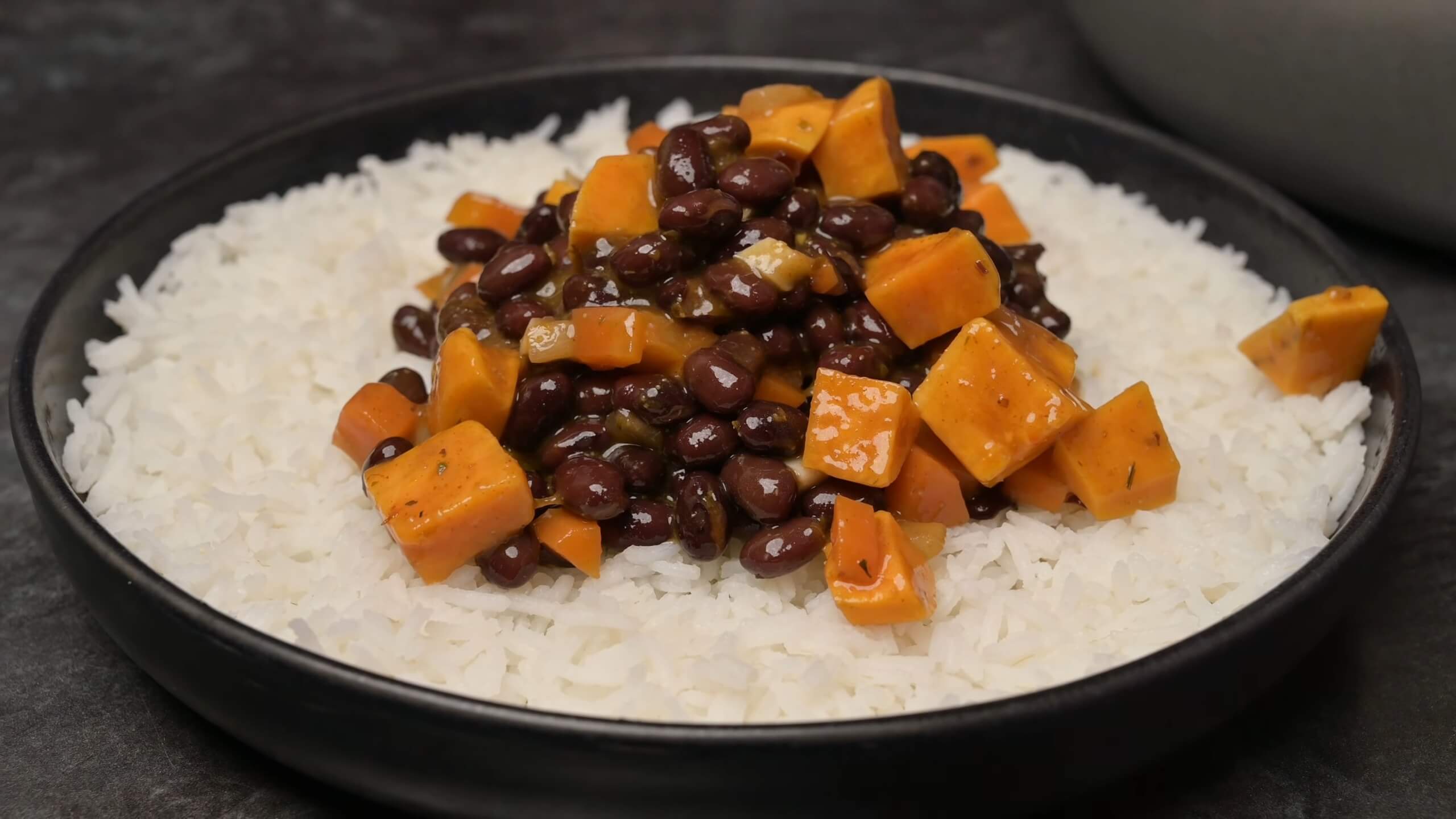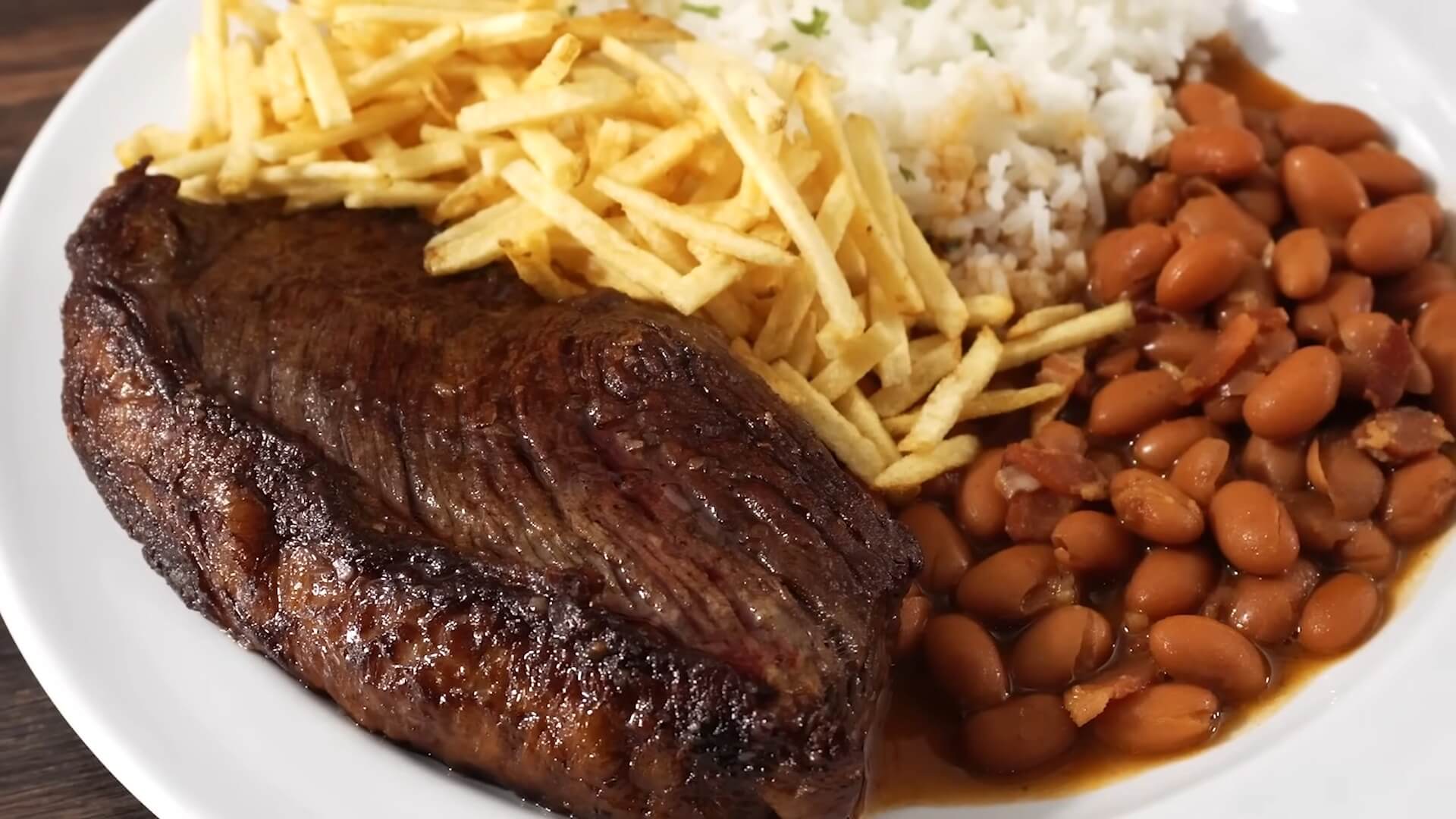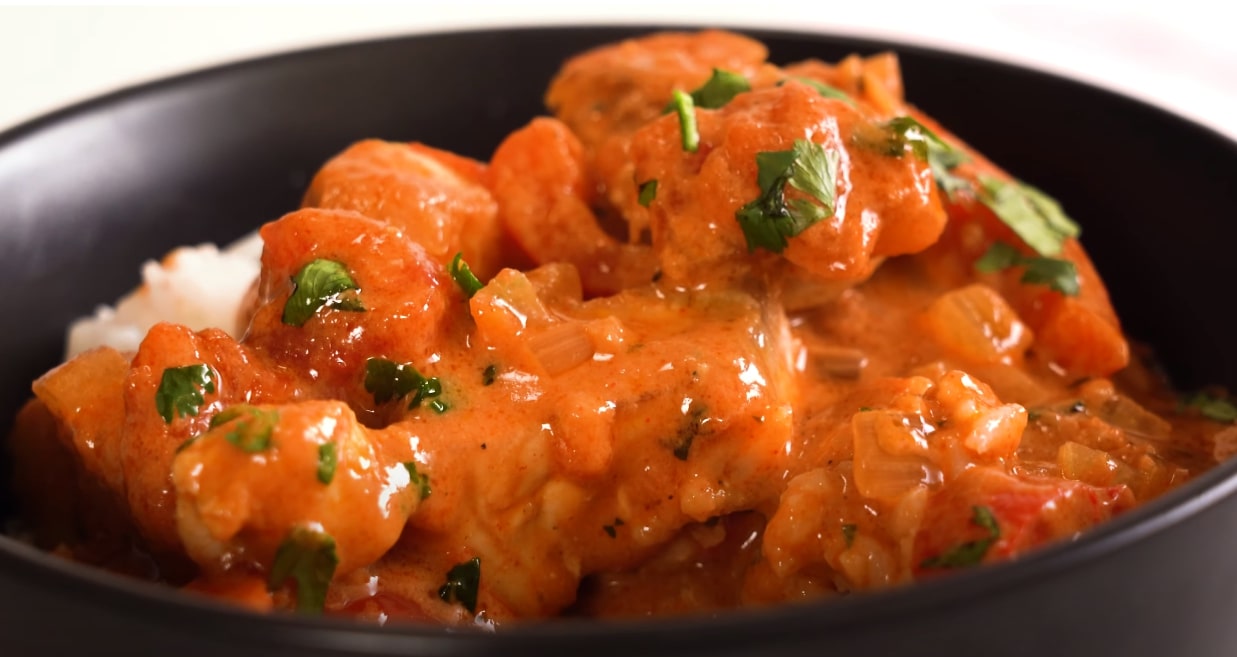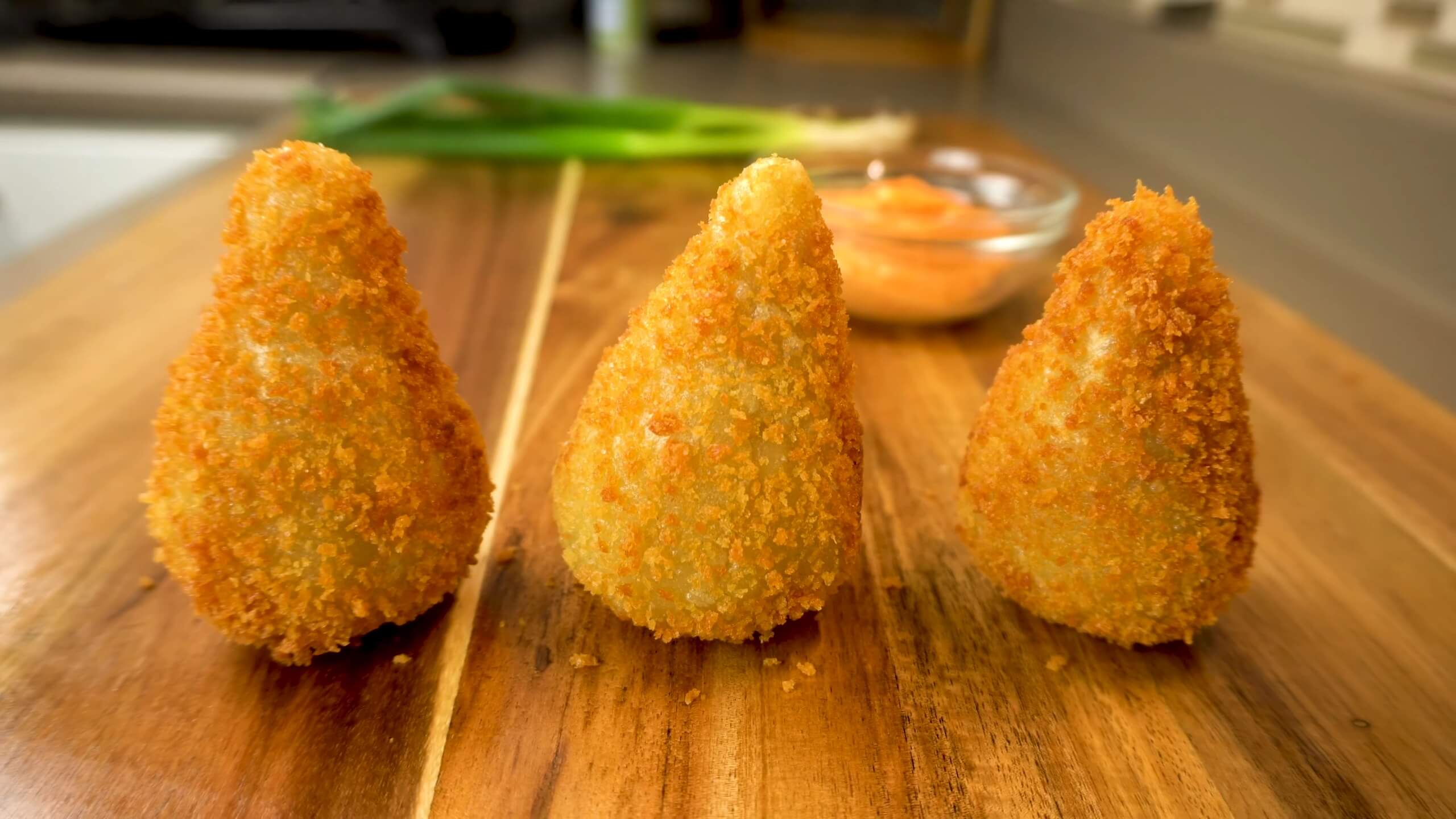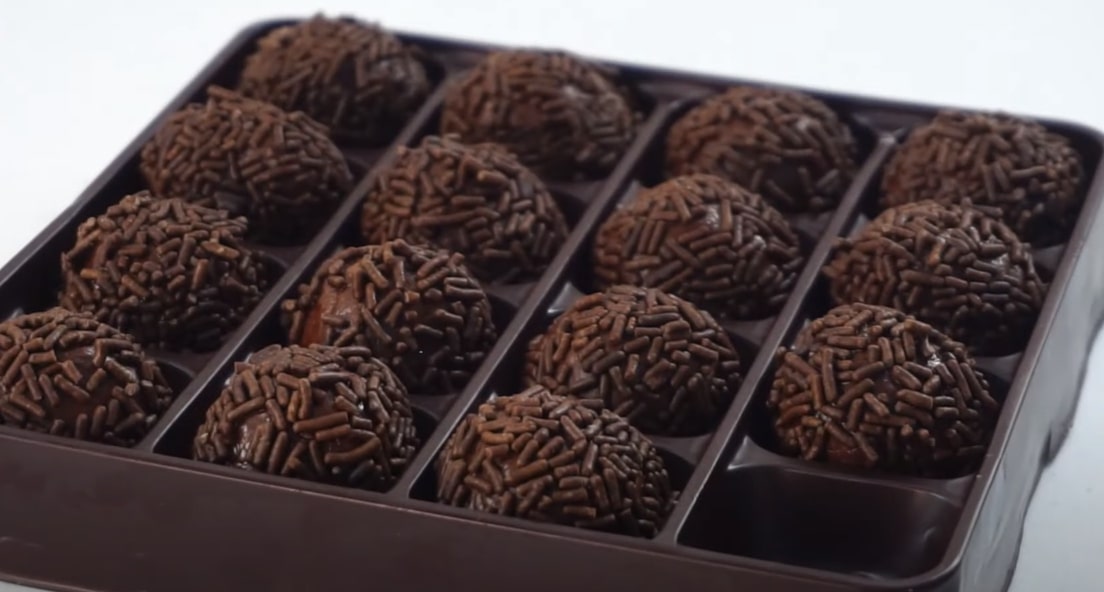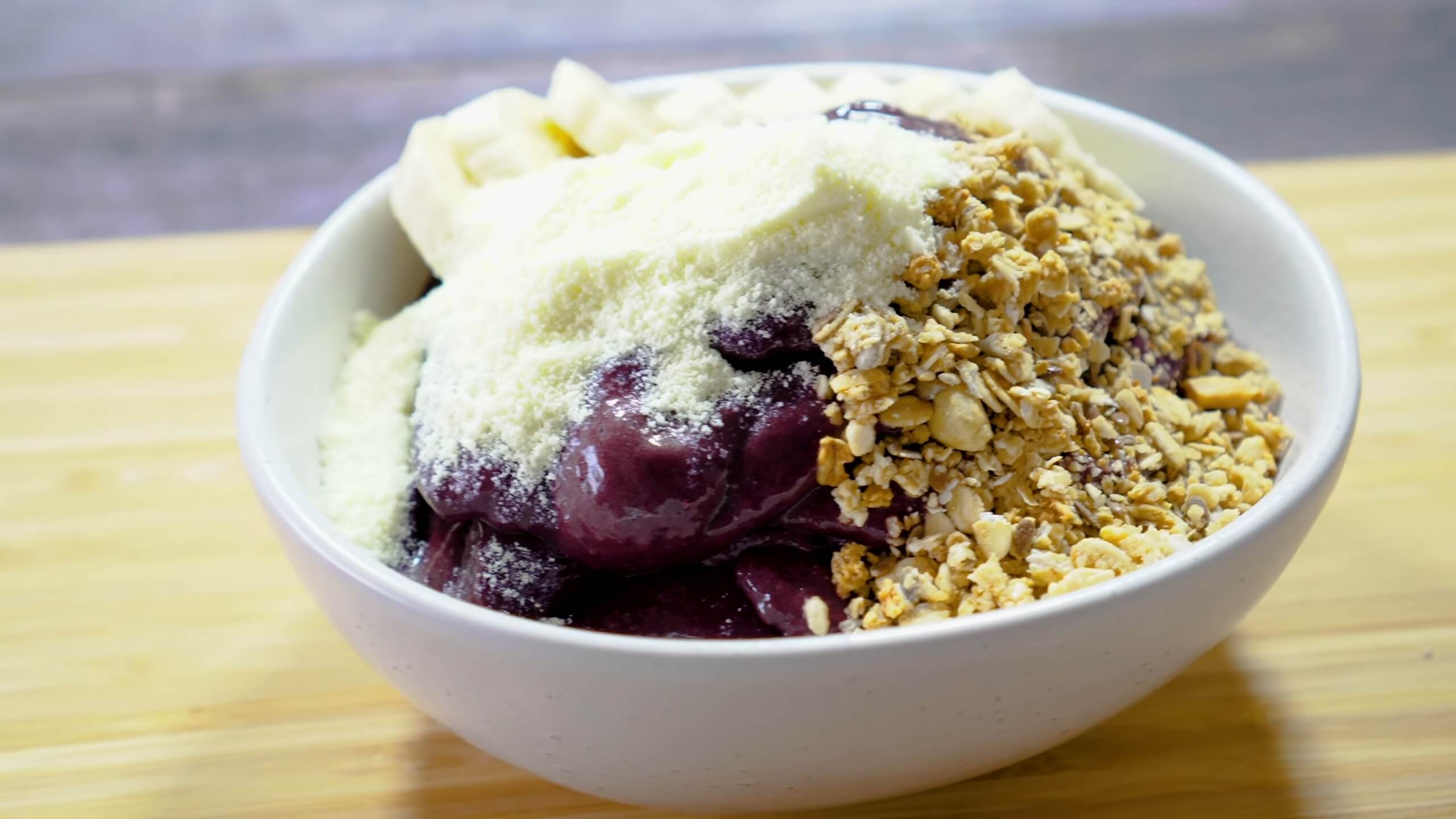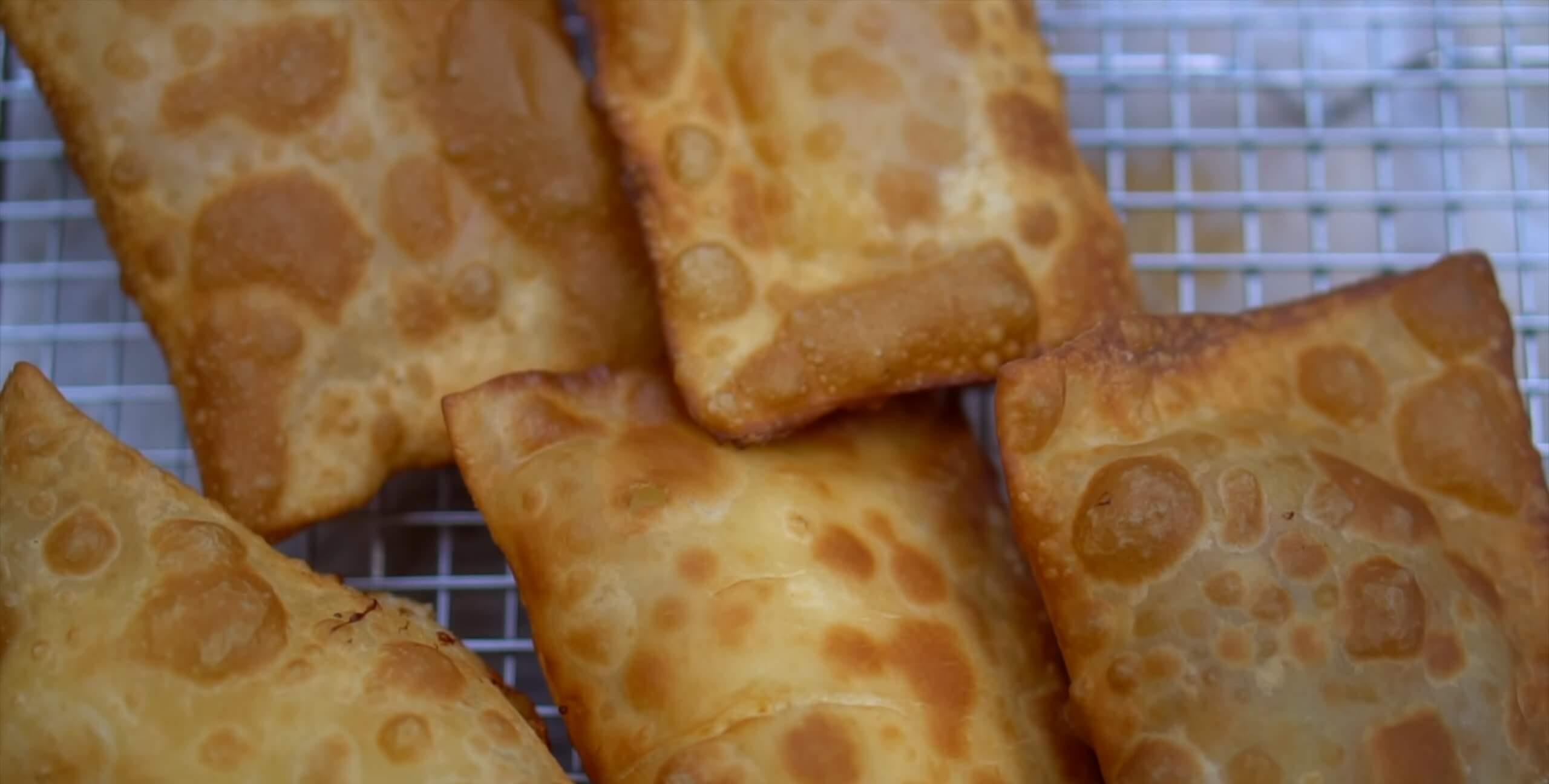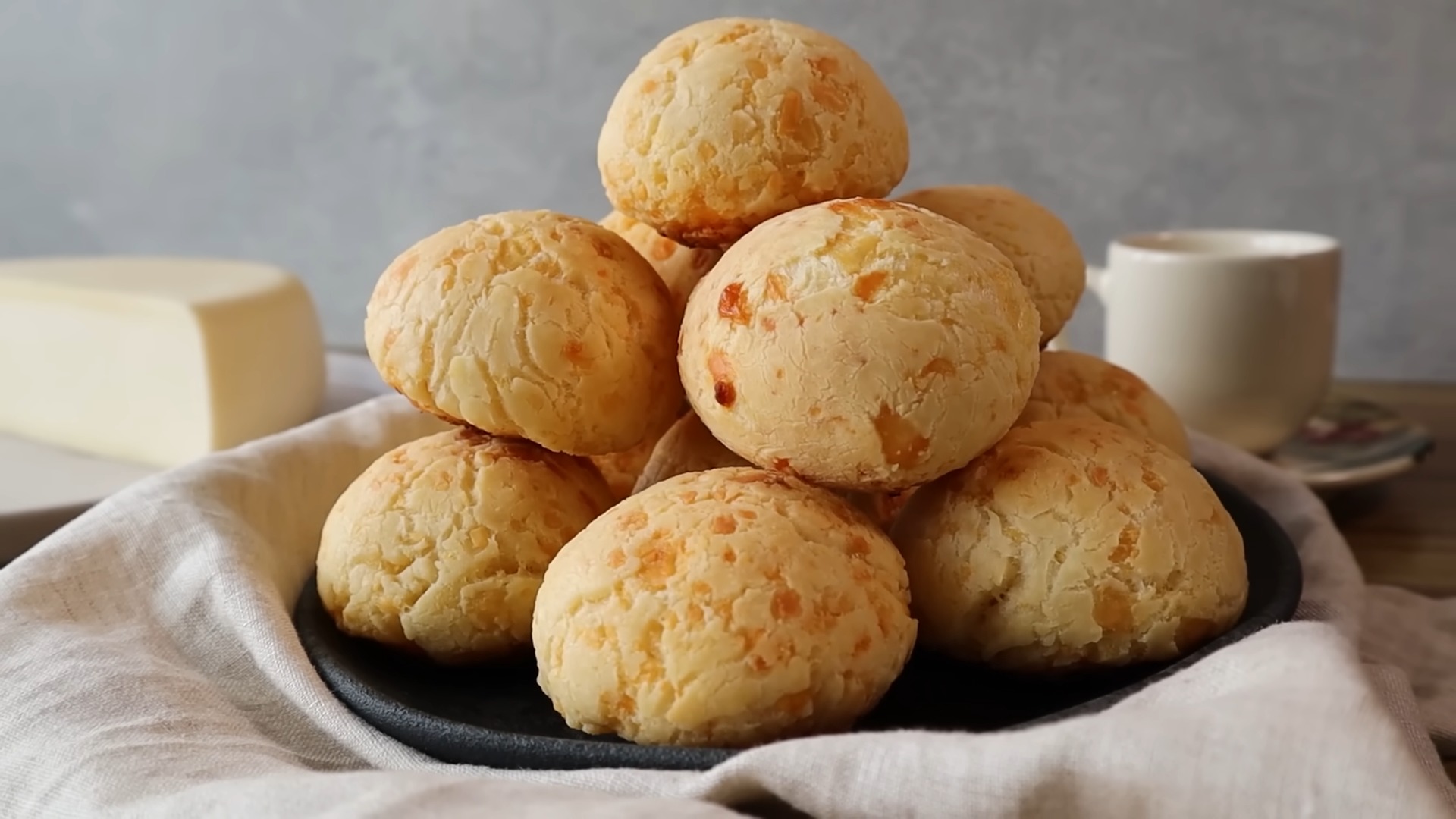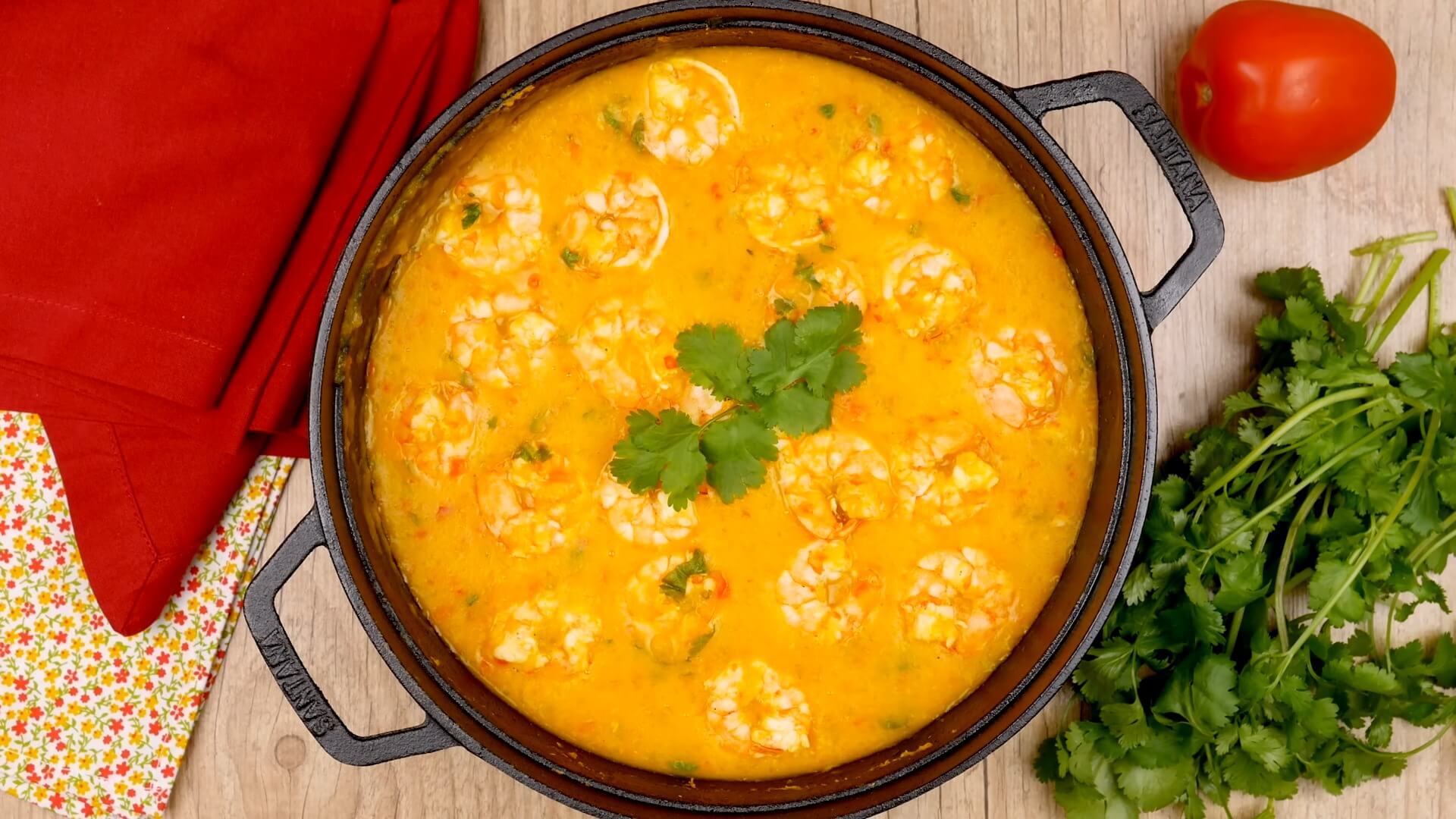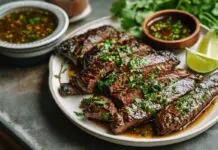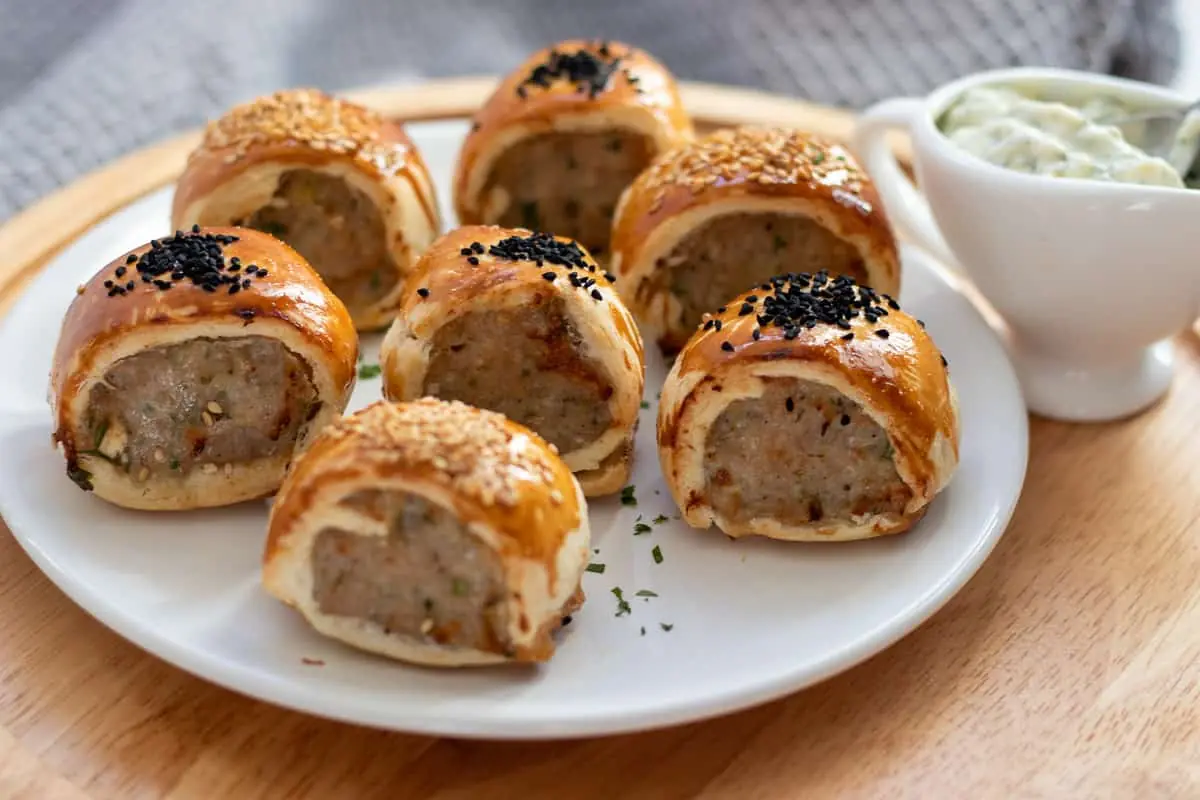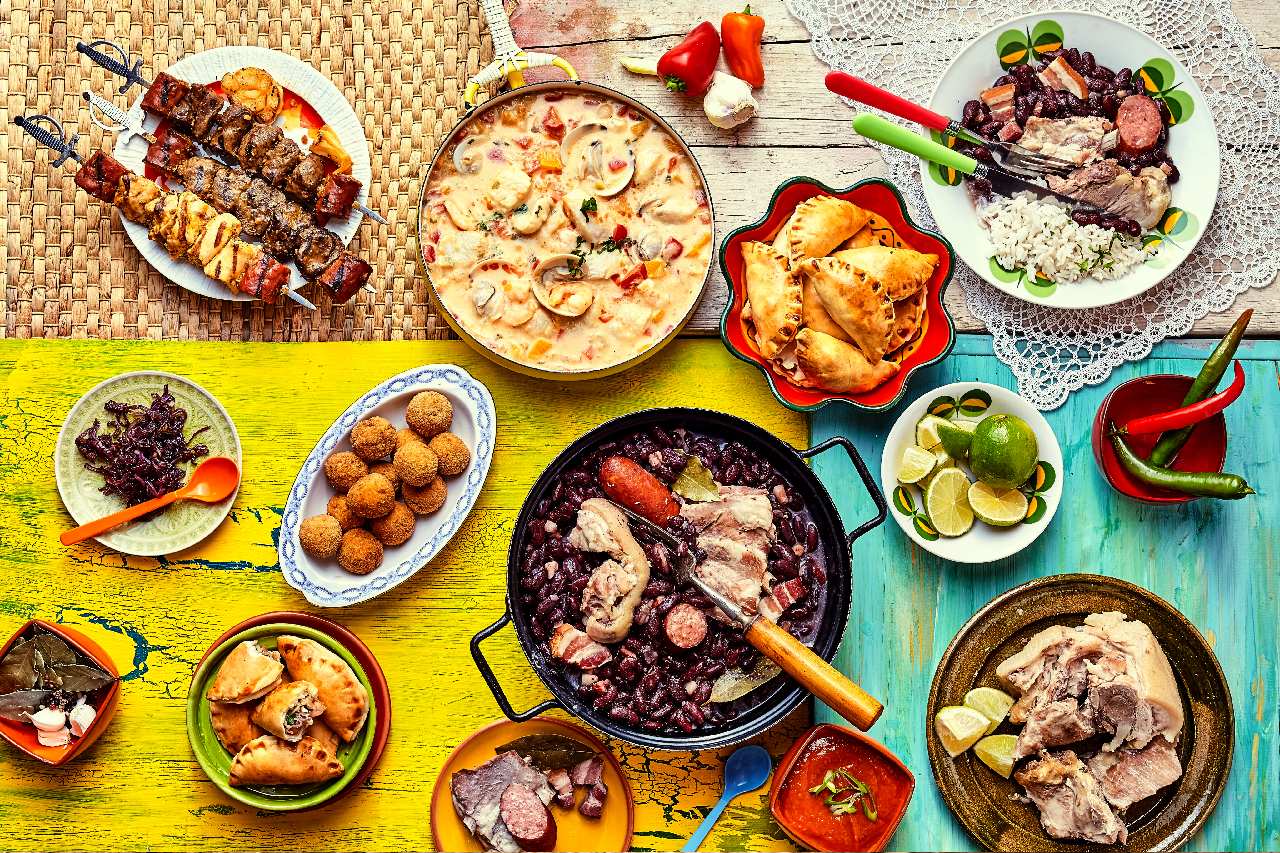
Foods from Brazil represents a blend of indigenous, Portuguese, African, and immigrant influences, resulting in a variety of flavorful and diverse dishes.
And when it comes to Indigenous culture, you should know that Indigenous languages are still among the most spoken languages in Brazil.
If you’re planning to visit Brazil or are simply curious about its culinary delights, exploring traditional foods from Brazil is a must. Also, each city has something special to offer when ti comes to both restaurants and street food.
Here are ten must-try food from Brazil that shows the best of culture and flavors.
These Are the Best Foods From Brasil
1.Feijoada
| Dish | Feijoada |
|---|---|
| Type | Stew |
| Main Ingredients | Black beans, pork, beef |
| Origin | Brazil |
| Served With | Rice, collard greens, orange slices, farofa |
Feijoada is a traditional Brazilian stew made with black beans and a variety of pork cuts, including sausage, bacon, and often beef. It’s considered the national dish of Brazil and is deeply rooted in the country’s food culture.
Originating from the Portuguese feijoada, this dish is typically cooked slowly over low heat, allowing the flavors to meld together beautifully.
Feijoada is usually served with rice, collard greens, orange slices, and farofa (toasted cassava flour). The combination of ingredients creates a hearty and flavorful meal that’s enjoyed throughout Brazil.
The experience of trying this food will be even better at some special events. that’s why you should check out Paraty and its amazing festivals and events, including the Paraty Gastronomy Festival.
This dish is especially popular on Wednesdays and Saturdays when many Brazilian restaurants feature it as a special.
Also, I recently tried Amazonian feijoada during my trip to Belem, and it was also amazing.
And if you are into fun facts about Brazil, this meal represents their national food, like Pizza in Italy.
If you’re exploring foods from Brazil, feijoada is a must-try for its rich taste and cultural significance. Whether you’re dining at a local restaurant or trying your hand at Brazilian recipes at home, this dish offers a true taste of Brazil.
Also, one of the best cities for local traditional food is Florianopolis, and that is only of the reasons why you should visit this Brazilian city.
Best Places to Try Feijoada
- Casa da Feijoada in Rio de Janeiro is renowned for its authentic feijoada.
- Bolinha in São Paulo has been serving this dish for over 70 years and is highly recommended.
- Bar do Mineiro in Santa Teresa, Rio de Janeiro, offers a rustic and traditional dining experience with excellent feijoada.
We also have to mention the Gastronomy Festival in Paraty, where you will have a chance to try the “real” traditional feijoada along with many other dishes.
Feijoada Recipe
To prepare feijoada at home, you’ll need the following ingredients:
- 500g black beans
- 1kg assorted pork cuts (ribs, ears, tail, sausage)
- 200g beef (optional)
- 2 onions, chopped
- 4 cloves garlic, minced
- 2 bay leaves
- Salt and pepper to taste
- Orange slices for garnish
Instructions
- Soak the black beans overnight.
- In a large pot, cook the pork cuts and beef until browned.
- Add the onions and garlic, cooking until fragrant.
- Drain and add the soaked beans to the pot.
- Pour in enough water to cover the mixture.
- Add the bay leaves and season with salt and pepper.
- Simmer on low heat for several hours until the beans and meat are tender.
- Serve with rice, collard greens, orange slices, and farofa.
2.Picanha
| Dish | Picanha |
|---|---|
| Type | Barbecue |
| Main Ingredients | Rump cap steak |
| Origin | Brazil |
| Served With | Farofa, rice, vinaigrette |
Picanha is one of the most popular Brazilian dishes, especially loved by meat enthusiasts.
This cut of beef, also known as rump cap, is prized for its tenderness and flavor. It is typically grilled over an open flame and seasoned simply with coarse salt to enhance its natural taste.
Picanha is quite common in Brazilian churrascarias (barbecue restaurants), where it is cooked on skewers and sliced thinly.
This dish showcases Brazil’s rich barbecue tradition, making it a must-try when you explore Brazilian food.
If you are planning to visit Brazil, one of the most interesting things you can do is to observe some endangered species in their natural habitats.
Best Places to Try Picanha
- Fogo de Chão in São Paulo is famous for its expertly grilled picanha.
- Churrascaria Palace in Rio de Janeiro offers a traditional rodízio experience with top-notch picanha.
- Barbacoa in various cities across Brazil is renowned for its high-quality barbecue.
Picanha Recipe
To prepare picanha at home, you’ll need the following ingredients:
- 1kg picanha (rump cap steak)
- Coarse salt
- Olive oil (optional for brushing)
Instructions
- Preheat your grill to high heat.
- Score the fat cap of the picanha lightly.
- Rub coarse salt generously over the meat.
- Place the picanha on the grill, fat side down.
- Grill for about 20-25 minutes, turning occasionally, until the meat reaches your desired level of doneness.
- Let the meat rest for a few minutes before slicing it against the grain.
- Serve with farofa, rice, and vinaigrette.
3.Moqueca
| Dish | Moqueca |
|---|---|
| Type | Stew |
| Main Ingredients | Fish, coconut milk, tomatoes, onions, bell peppers |
| Origin | Brazil |
| Served With | Rice, farofa |
Moqueca is a traditional Brazilian fish stew that reflects the rich culinary heritage of Brazil. This dish combines fresh fish with tomatoes, onions, bell peppers, and coconut milk, creating a flavorful and aromatic stew. Moqueca has regional variations, with the two most popular being Moqueca Baiana from Bahia and Moqueca Capixaba from Espírito Santo.
Another great place where you can enjoy this amazing food is Natal Brazil.
Moqueca Baiana includes ingredients like dendê oil (palm oil) and coconut milk, which give it a rich and creamy texture. On the other hand, Moqueca Capixaba is lighter and uses olive oil instead of dendê oil. Both versions are typically served with rice and farofa, a toasted cassava flour mixture.
It’s especially pleasant to enjoy this type of food when lying on a beach, or in some restaurant nearby. I was in Buzios Brazil recently, and this one was my favorite option in local restaurants around those amazing beaches there.
Best Places to Try Moqueca
- Sorriso da Dadá in Salvador, Bahia is famous for its delicious Moqueca Baiana.
- Restaurante Gaeta in Vitória, Espírito Santo, offers an authentic Moqueca Capixaba.
- Tereza Paim in Salvador provides a high-end dining experience with exquisite moqueca.
Moqueca Recipe
To prepare moqueca at home, you’ll need the following ingredients:
- 1kg fresh fish fillets (such as snapper or cod)
- 2 tomatoes, chopped
- 2 onions, chopped
- 1 bell pepper, chopped
- 400ml coconut milk
- 2 tablespoons dendê oil (palm oil) or olive oil
- 2 cloves garlic, minced
- Juice of 1 lime
- Fresh cilantro, chopped
- Salt and pepper to taste
Instructions
- Marinate the fish fillets with lime juice, garlic, salt, and pepper for about 30 minutes.
- In a large pot, heat the dendê oil or olive oil over medium heat.
- Add the onions, tomatoes, and bell peppers, and sauté until they soften.
- Add the coconut milk and bring to a simmer.
- Carefully place the marinated fish fillets into the pot, covering them with the sauce.
- Simmer for about 15-20 minutes, until the fish is cooked through.
- Garnish with fresh cilantro and serve with rice and farofa.
4.Coxinha
| Dish | Coxinha |
|---|---|
| Type | Snack |
| Main Ingredients | Chicken, cream cheese, dough |
| Origin | Brazil |
| Served With | Hot sauce, ketchup |
Coxinha is a popular Brazilian snack that you can find everywhere, from street vendors to high-end restaurants. These delicious chicken croquettes are made from shredded chicken and sometimes cream cheese encased in a soft dough and deep-fried to golden perfection. Coxinha, which means “little thigh” in Portuguese, gets its name from its distinctive shape that resembles a chicken drumstick.
This snack is a favorite among Brazilians and is perfect for any time of the day, whether you’re grabbing a quick bite or enjoying it as an appetizer. It’s also a staple at parties and gatherings, making it a beloved part of Brazilian food culture.
Best Places to Try Coxinha
- Frangó in São Paulo is famous for its coxinha, offering a variety of flavors and fillings.
- Veloso Bar in São Paulo is another top spot known for its classic and tasty coxinha.
- Lanchonete da Cidade in Rio de Janeiro serves traditional coxinha with a modern twist.
Coxinha Recipe
To prepare coxinha at home, you’ll need the following ingredients:
- 500g chicken breast, cooked and shredded
- 200g cream cheese
- 1 onion, finely chopped
- 2 cloves garlic, minced
- 500ml chicken broth
- 2 cups all-purpose flour
- 1 cup breadcrumbs
- 2 eggs, beaten
- Vegetable oil for frying
- Salt and pepper to taste
Instructions
- In a large pot, heat a bit of oil and sauté the onion and garlic until fragrant.
- Add the shredded chicken and season with salt and pepper.
- Mix in the cream cheese and cook until well combined. Set aside.
- In another pot, bring the chicken broth to a boil.
- Gradually add the flour, stirring constantly until the dough forms and pulls away from the sides of the pot.
- Let the dough cool slightly, then knead until smooth.
- Take a small portion of the dough, flatten it in your hand, and add a spoonful of the chicken mixture.
- Shape the dough around the filling, forming it into a teardrop shape.
- Dip each coxinha in beaten eggs, then roll in breadcrumbs.
- Heat the oil in a deep fryer or large pot to 180°C (350°F).
- Fry the coxinhas until golden brown and crispy.
- Drain on paper towels and serve with hot sauce or ketchup.
Off-topic: If you are planning a trip to Brazil, be sure to check the best time to go there.
5.Brigadeiros
| Dish | Brigadeiros |
|---|---|
| Type | Dessert |
| Main Ingredients | Condensed milk, cocoa powder, butter |
| Origin | Brazil |
| Served With | Chocolate sprinkles |
Brigadeiros are a quintessential Brazilian dessert, often referred to as the national sweet of Brazil. These delightful chocolate fudge balls are made from condensed milk, cocoa powder, and butter, then rolled in chocolate sprinkles. They are a staple at Brazilian celebrations, especially birthdays, and are enjoyed by people of all ages.
Best Places to Try Brigadeiros
- Brigadeiro Bakery in São Paulo specializes in a variety of brigadeiros with unique flavors.
- Maria Brigadeiro in São Paulo offers artisanal brigadeiros with gourmet ingredients.
- Brigadeiros by Cousins in Rio de Janeiro provides a cozy atmosphere and delicious brigadeiros.
Brigadeiros Recipe
To prepare brigadeiros at home, you’ll need the following ingredients:
- 1 can (395g) condensed milk
- 3 tablespoons cocoa powder
- 2 tablespoons butter
- Chocolate sprinkles for coating
Instructions
- In a medium saucepan, combine the condensed milk, cocoa powder, and butter.
- Cook over medium heat, stirring constantly, until the mixture thickens and starts to pull away from the sides of the pan (about 10 minutes).
- Remove from heat and let the mixture cool.
- Once cool, grease your hands with butter and roll small portions of the mixture into balls.
- Roll each ball in chocolate sprinkles until fully coated.
- Place the brigadeiros in small paper cups and serve.
6.Açaí na Tigela
| Dish | Açaí na Tigela |
|---|---|
| Type | Snack/Bowl |
| Main Ingredients | Açaí berries, granola, banana, honey |
| Origin | Brazil |
| Served With | Granola, banana, honey, other fruits |
Açaí na Tigela is a popular Brazilian food that has gained international acclaim for its delicious taste and health benefits. This dish is made from açaí berries, which are native to the Amazon rainforest. The berries are blended into a thick, smoothie-like consistency and are typically served in a bowl with various toppings such as granola, bananas, and honey. It’s a favorite snack or light meal among Brazilians and has become a symbol of Brazilian cuisine.
Best Places to Try Açaí na Tigela
- Tacacá do Norte in Rio de Janeiro offers a traditional açaí bowl with authentic flavors.
- Bibi Sucos in Rio de Janeiro provides a variety of açaí bowls with different toppings.
- Amazonia Soul in São Paulo is known for its high-quality açaí and fresh ingredients.
Açaí na Tigela Recipe
To prepare açaí na tigela at home, you’ll need the following ingredients:
- 200g frozen açaí pulp
- 1 banana
- 1/2 cup granola
- 1 tablespoon honey
- Fresh fruits (optional)
Instructions
- In a blender, combine the frozen açaí pulp and half of the banana.
- Blend until smooth and thick.
- Pour the mixture into a bowl.
- Slice the remaining half of the banana and arrange it on top.
- Add granola and drizzle with honey.
- Top with additional fresh fruits if desired.
7.Pastel
| Dish | Pastel |
|---|---|
| Type | Snack/Street Food |
| Main Ingredients | Pastry dough, various fillings (cheese, meat, chicken, etc.) |
| Origin | Brazil |
| Served With | Hot sauce, sugar cane juice |
Pastel is a quintessential Brazilian street food that is enjoyed by locals and tourists alike. These deep-fried pastries come with various fillings, including cheese, ground beef, chicken, and even sweet options like chocolate or guava paste. The dough is thin and crispy, making pastéis a perfect snack for any time of the day.
Best Places to Try Pastel
- Mercadão de São Paulo in São Paulo is famous for its large and delicious pastéis.
- Feira de São Cristóvão in Rio de Janeiro offers a wide variety of pastéis with different fillings.
- Pastelaria Brasileira in Rio de Janeiro is a popular spot for enjoying traditional pastéis.
Pastel Recipe
To prepare pastel at home, you’ll need the following ingredients:
- 2 cups all-purpose flour
- 1 teaspoon salt
- 1/4 cup vegetable oil
- 1/2 cup warm water
- Fillings (cheese, ground beef, chicken, etc.)
- Oil for frying
Instructions
- In a large bowl, combine the flour and salt.
- Add the vegetable oil and warm water, mixing until a dough forms.
- Knead the dough until smooth, then cover and let it rest for 30 minutes.
- Roll out the dough on a floured surface until thin.
- Cut the dough into squares or circles, depending on your preference.
- Place a spoonful of your desired filling in the center of each piece of dough.
- Fold the dough over the filling and press the edges to seal.
- Heat the oil in a deep fryer or large pot to 180°C (350°F).
- Fry the pastéis until golden brown and crispy.
- Drain on paper towels and serve with hot sauce or sugar cane juice.
And if you want to taste the diversity of this country, and try some food with a rich history of German and Italian heritage, you should visit Santa Catarina.
8.Pão de Queijo
| Dish | Pão de Queijo |
|---|---|
| Type | Snack/Bread |
| Main Ingredients | Tapioca flour, cheese, eggs, milk |
| Origin | Brazil |
| Served With | Butter, coffee |
Pão de Queijo, or Brazilian cheese bread, is a popular snack in Brazil, particularly in the state of Minas Gerais. These small, cheese-filled bread rolls are made with tapioca flour, giving them a unique chewy texture. They are a favorite breakfast item or afternoon snack, often enjoyed with a cup of coffee.
Best Places to Try Pão de Queijo
- Casa do Pão de Queijo in São Paulo offers a variety of flavors and sizes.
- Pão de Queijo Haddock Lobo in Rio de Janeiro is famous for its freshly baked cheese bread.
- Empório Mineiro Cheirin Bão in Belo Horizonte serves traditional pão de queijo made with local ingredients.
Pão de Queijo Recipe
To prepare pão de queijo at home, you’ll need the following ingredients:
- 2 cups tapioca flour
- 1 cup milk
- 1/2 cup butter
- 1 teaspoon salt
- 1 1/2 cups grated cheese (Parmesan or Minas cheese)
- 2 eggs
Instructions
- Preheat the oven to 180°C (350°F).
- In a saucepan, combine the milk, butter, and salt. Bring to a boil.
- Remove from heat and slowly add the tapioca flour, stirring constantly until smooth.
- Let the mixture cool slightly, then mix in the grated cheese and eggs until well combined.
- Form small balls with the dough and place them on a baking sheet lined with parchment paper.
- Bake for 20-25 minutes, until golden brown.
9.Bobó de Camarão
| Dish | Bobó de Camarão |
|---|---|
| Type | Stew |
| Main Ingredients | Shrimp, coconut milk, cassava (yuca), tomatoes, onions |
| Origin | Brazil |
| Served With | Rice, farofa |
Bobó de Camarão is a traditional Brazilian shrimp stew that originates from the state of Bahia. This dish combines shrimp with a creamy mixture of mashed cassava (yuca), coconut milk, and dendê oil, creating a rich and flavorful stew. It reflects the Afro-Brazilian culinary heritage, making it a popular and beloved dish in Brazil.
Best Places to Try Bobó de Camarão
- Restaurante Yemanjá in Salvador, Bahia is renowned for its authentic Bahian cuisine, including a delicious Bobó de Camarão.
- Padaria Brasileira in São Paulo offers freshly made Quindim with authentic flavors.
- Casa de Tereza in Salvador serves exquisite Bobó de Camarão in a cozy and traditional setting.
Bobó de Camarão Recipe
To prepare Bobó de Camarão at home, you’ll need the following ingredients:
- 1kg shrimp, peeled and deveined
- 500g cassava (yuca), peeled and chopped
- 1 can (400ml) coconut milk
- 2 tablespoons dendê oil (palm oil)
- 2 tomatoes, chopped
- 1 onion, chopped
- 1 red bell pepper, chopped
- 2 cloves garlic, minced
- 1 lime (juice)
- Fresh cilantro, chopped
- Salt and pepper to taste
Instructions
- Cook the cassava in boiling water until tender, then drain and mash until smooth.
- In a large pot, heat the dendê oil over medium heat.
- Add the onion, garlic, tomatoes, and bell pepper, and sauté until softened.
- Stir in the mashed cassava and coconut milk, mixing well to combine.
- Add the shrimp and cook until they turn pink and are fully cooked.
- Season with lime juice, salt, and pepper.
- Garnish with fresh cilantro and serve with rice and farofa.
10. Acarajé
| Dish | Acarajé |
|---|---|
| Type | Snack/Street Food |
| Main Ingredients | Black-eyed peas, onions, palm oil |
| Origin | Brazil |
| Served With | Vatapá, caruru, shrimp |
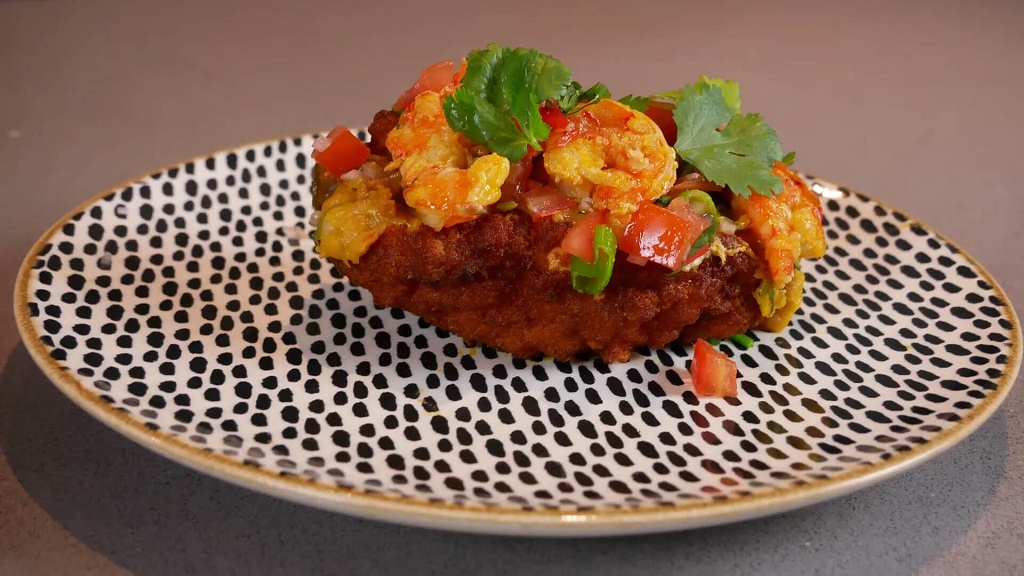
Acarajé is a popular Brazilian street food, particularly in the state of Bahia. This dish consists of deep-fried balls made from black-eyed peas and onions, typically fried in dendê (palm oil). Acarajé is often served split open and filled with vatapá (a creamy paste made from shrimp, coconut milk, peanuts, and bread) and caruru (a spicy okra paste).
This snack is deeply rooted in Afro-Brazilian culture and is a must-try for anyone exploring Brazilian cuisine.
Best Places to Try Acarajé
- Dinha do Acarajé in Salvador is famous for its authentic and delicious acarajé.
- Acarajé da Cira in Rio Vermelho, Salvador, is another top spot known for its traditional preparation of acarajé.
- Acarajé da Ivone in Salvador offers a cozy setting and delicious acarajé.
Acarajé Recipe
To prepare acarajé at home, you’ll need the following ingredients:
- 500g black-eyed peas
- 1 onion, chopped
- 2 tablespoons salt
- Palm oil for frying
Instructions
- Soak the black-eyed peas overnight to soften.
- Rub the beans to remove the skins, then rinse and drain.
- In a food processor, blend the black-eyed peas and onions until smooth.
- Add salt to taste and mix well.
- Heat the palm oil in a deep fryer or large pot to 180°C (350°F).
- Form the mixture into small balls and carefully drop them into the hot oil.
- Fry until golden brown and crispy.
- Drain on paper towels and serve with vatapá, caruru, and shrimp.
FAQs
What is Brazil’s national dish?
Brazil’s national dish is Feijoada. It’s a rich, hearty stew made with black beans and various cuts of pork. It’s often served with rice, collard greens, orange slices, and farofa.
Is Brazil expensive to eat?
Eating in Brazil can range from very affordable to quite expensive, depending on where you go. Street food and local markets offer delicious and budget-friendly options, while dining at upscale restaurants or in tourist areas can be pricier.
What’s a typical Brazilian breakfast?
A typical Brazilian breakfast, or café da manhã, usually includes fresh bread rolls (pão francês) with butter, cheese, ham, fruits, and coffee. Pão de queijo (cheese bread) is also a popular choice.
What is the most famous dessert in Brazil?
The most famous dessert in Brazil is Brigadeiros. These chocolate fudge balls are made with condensed milk, cocoa powder, and butter, then rolled in chocolate sprinkles. They’re a staple at celebrations and loved by everyone.
Final Thoughts
Foods in Brazil is a delightful journey into a world of unique flavors and traditions. Each dish offers a taste of the country’s diverse cultural influences, from the savory Feijoada to the sweet Brigadeiros. Whether you’re visiting Brazil or trying your hand at these recipes at home, you’re in for a treat.
If you’re in Brazil, don’t miss out on local spots like Casa da Feijoada for Feijoada or Frangó for the best Coxinha. These places are known for their authentic flavors and are highly recommended. For those cooking at home, these recipes are simple yet packed with the rich tastes of Brazil. Enjoy dishes like Picanha, Moqueca, and Pão de Queijo to get a real sense of Brazilian cuisine.
Also, I am planning to explore the best food from other countries, so keep checking for the latest insights and new recipes I will share.
Check out next: Best Greek Recipes

